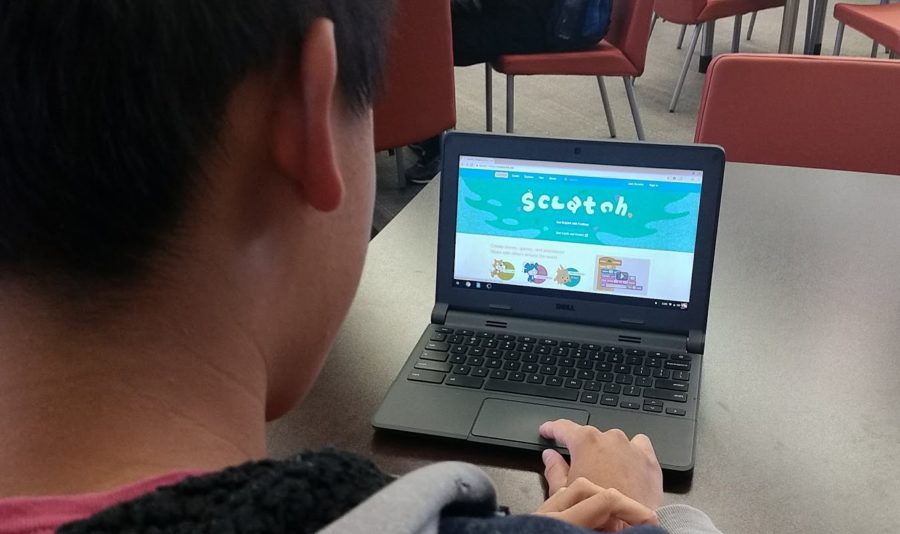Students Scratch the Surface During Hour of Code
Chen works with the Scratch program to create games, such as a ball moving through a maze.
Students participated in Hour of Code to learn the basics of coding using Scratch, an MIT-developed program, during advisement on Dec. 6. Hour of Code is a global initiative that gives students a 60-minute exploration of computer programming.
“We were starting to have all these careers open up in computer science. What they [statistics] are projecting is that there is not enough people interested in technology to go and fill the needs that they [these fields] are going to need in the future,” assistant principal Kris Linville said. “Hour of Code was a way of them saying let’s start getting kids interested in coding and realizing the bigger story of what coding does.”
Students were taught how to create simple games using “blocks” that controlled the actions of sprites in the game. These “blocks” had simple commands and phrases written on them for students to read and understand, though each one contained a series of coding that performed the given functions.
“When programming is just made out of letters and numbers, like I know with Java, it’s not relatable. But when you have a gobo or a Scratch-cat (characters available on Scratch Programming) flying around, now that is something fun,” sophomore Joyee Chen said.
There are a few clubs that work with coding, such as Robotics Club and Coding and Computer Science Club, as well as a program called APPJAM where participants learn how to code and create apps. Portola is looking to expand its coding classes and programs in the coming years.
“Next year, we are going to have some computer science classes,” Linville said. “We have languages like Python, Java and HTML. These are all languages that are almost like a foreign language, where to me, I would hope in the future colleges can even look at these and say that it’s almost like taking a language class.”
According to a report by Burning Glass Technologies, half of the jobs in the top income quartile, which is any income over $57,000 dollars a year, typically require coding skills from applicants; in addition, seven million job openings in 2015 are from occupations that value coding skills.
“I think it’s important [to learn coding skills] for a lot of jobs now, because you don’t usually get to do a job now that doesn’t have any technology requirements,” freshman Ashley Presnell said. “You have to know a little bit about computers to be able to compete with others for jobs.”
Some students may discover an interest in coding as a result of Hour of Code and possibly even pursue it as a career.
“Once again, get a taste of what it’s like, and if you love it, go back at it,” Linville said.
Your donation will support the student journalists of Portola High School. Your contribution will allow us to purchase equipment and cover our annual website hosting costs.

Maya Sabbaghian is one of two 2019-2020 Managing Editors. A staff member since 2016, Maya has previously served as a 2017-2018 Editor-in-Chief, and as...




